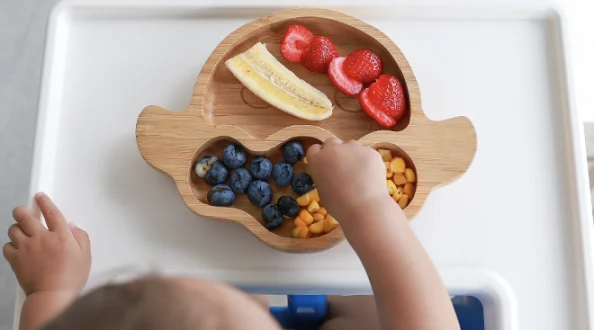
Have you ever considered how the snacks you provide your baby impact their development? As babies grow, their nutritional needs, motor skills, and cognitive abilities rapidly evolve. Age-appropriate baby foods can play a significant role in supporting their developmental milestones. From learning to chew to developing the pincer grasp, choosing the right snacks helps babies reach these key stages more effectively.
Feeding your sweetheart the right baby snacks at the right age isn’t just about nutrition—it’s about providing opportunities for exploration and growth. Let’s explore how age-appropriate baby foods contribute to essential developmental milestones and what parents should consider when selecting snacks to support their infants’ progress.
Nutritional Needs for Each Stage of Development
At each stage of a baby’s growth, their body requires different nutrients to support brain development, muscle growth, and overall health. Age-appropriate snacks are formulated to provide these essential nutrients at the right time, ensuring babies get what they need as they progress through various milestones.
Babies begin their journey with liquid nutrition—whether breastmilk or formula—but their nutritional needs shift as they grow. Here’s how snacks can support those needs:
- 6-9 months: Babies need more iron and zinc, which can be introduced through age-appropriate snacks like fortified cereals or pureed meats.
- 9-12 months: As babies begin crawling and becoming more active, snacks rich in healthy fats and proteins are essential to support energy levels and muscle development.
- 12+ months: At this stage, babies need a balance of all essential nutrients, including vitamins, minerals, and fibre, which can be provided through whole-grain snacks, fruits, and vegetables.
By offering snacks that meet these changing needs, parents help ensure their baby is nourished for optimal growth and development.
Supporting Motor Skills with Snack Selection
Beyond nutrition, baby snacks also help develop critical motor skills for physical growth and independence. Age-appropriate snacks are designed with a texture and size that encourage babies to use their hands and mouths in ways that promote skill development.
- Developing the pincer grasp: Between 9 and 12 months, babies typically develop the pincer grasp—the ability to pick up small objects using their thumb and forefinger. Snacks like small, soft puffs or diced fruits are ideal for promoting this skill, as they encourage babies to practise picking up tiny pieces.
- Chewing and oral coordination: Around 6-9 months, babies start transitioning from pureed foods to solids, which helps them learn how to chew and manipulate food in their mouth. Age-appropriate snacks with a slightly firmer texture, like teething biscuits or soft crackers, help babies practise chewing without overwhelming their developing skills.
- Hand-eye coordination: Grabbing snacks, especially finger foods, helps babies refine their hand-eye coordination, a skill that continues to develop as they grow. Offering snacks that require reaching and grasping encourages this critical developmental milestone.
Parents can actively support their baby’s motor skill development by introducing age-appropriate snacks that cater to their current abilities.
Cognitive Development through Snack Exploration
Introducing age-appropriate snacks also helps babies develop cognitive skills as they learn about new tastes, textures, and experiences. Exploring a variety of flavours and textures stimulates a baby’s sensory system, allowing them to engage with food in ways that go beyond nutrition.
- Learning cause and effect: When babies begin self-feeding, they learn that reaching for a snack and bringing it to their mouth has a specific outcome—they get to eat! This simple activity teaches babies about cause and effect, an essential cognitive milestone.
- Sensory exploration: Snacks with various textures—whether soft, crunchy, or sticky—help babies develop their sensory understanding of the world. By offering snacks with different textures, parents can encourage babies to explore and learn about the food they eat.
- Problem-solving: As babies learn to manipulate food, they develop problem-solving skills. Figuring out how to pick up a piece of food, bite it, or chew it is an early form of problem-solving that prepares babies for more complex cognitive tasks later on.
These cognitive skills lay the foundation for learning and development as babies grow, making snack time an essential opportunity for growth beyond physical health.
Advantages of Age-Appropriate Snacks for Development
Offering snacks that match a baby’s developmental stage has numerous benefits. From improving motor skills to aiding cognitive development, age-appropriate snacks ensure babies get the most out of their feeding experiences. Here are some specific advantages:
- Oral motor development: Age-appropriate snacks encourage chewing, biting, and swallowing, which helps develop strong muscles for eating and speech.
- Independence in feeding: When babies are given snacks that are easy to handle based on their developmental stage, they gain confidence in feeding themselves, fostering independence.
- Safe self-feeding: Snacks designed for a baby’s age minimise choking hazards, allowing parents to feel confident that their child can eat independently while remaining secure.
Choosing age-appropriate baby foods is about more than simply filling your baby’s belly—it’s about supporting their growth, development, and independence. Snacks that align with your baby’s developmental stage can help them meet critical motor skills, cognitive abilities, and sensory exploration milestones. By offering snacks that suit your baby’s evolving needs, you can play an active role in helping them grow into confident, capable eaters. So, let’s make snack time more than just a meal—let’s make it an opportunity for your little one to learn, explore, and develop critical skills for the future.




